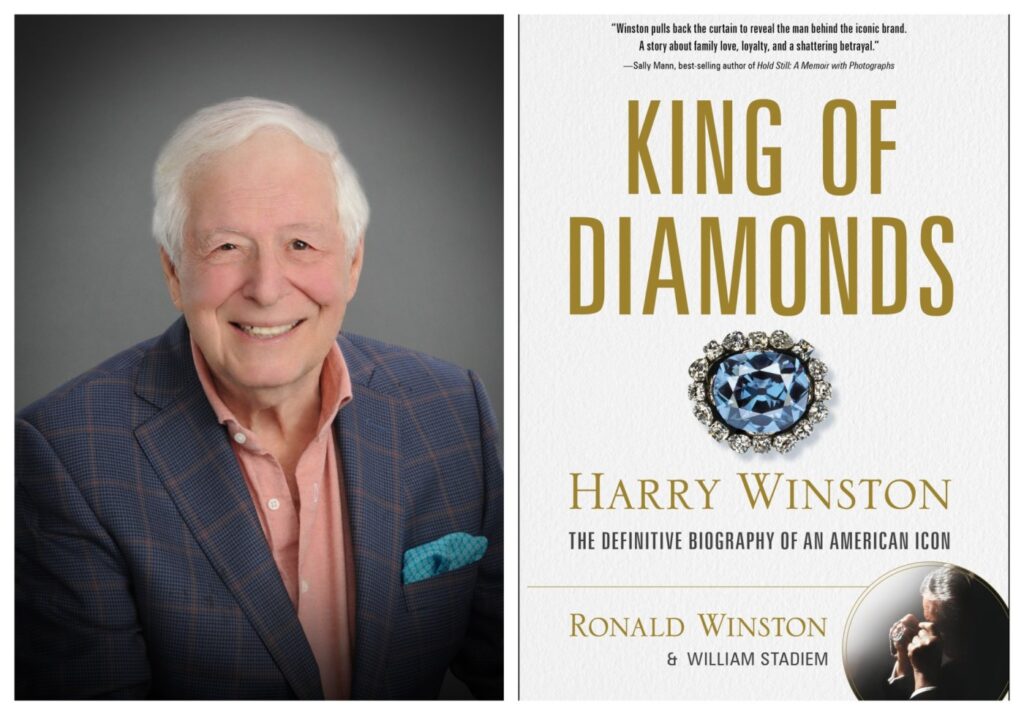
The world associates the name Harry Winston with glamour and jewels – it’s synonymous with Hollywood stars, royal families and captains of industry. Marilyn Monroe ushered the name into legend when she breathlessly sang, “Talk to me, Harry Winston; tell me all about it!” in 1953’s classic movie “Gentlemen Prefer Blondes.”
But for his eldest and only living son, Ronald Winston, the man behind the brand seems to have been a complicated person, as well as a hard-to-live-up-to icon.
Related: Sign up for our free Book Pages newsletter about bestsellers, authors and more
The opening pages of “King of Diamonds: Harry Winston, The Definitive Biography of An American Icon,” by Ronald Winston and William Stadiem, contain a telling episode from the author’s childhood: His famous jeweler father was “bouncing me around, having a wonderful time” in the family’s plush New York apartment.
Then suddenly, Winston dropped his son “hard and fast” onto the rug, shocking the child.
As young Ronald begins to cry, the famed jeweler tells him, “Never trust anyone in life. Not even your own father.”
“His intention was very pure and good but was not an exceptionally fine way to educate a child,” Ronald Winston said in an email interview earlier this month. “It was kind of a brutal way to impress upon a baby the uncaring nature of the world outside.”
As much a memoir of Winston’s own life navigating a world of wealth and intrigue as it is a biography of his famous father, “King of Diamonds” was published Sept. 19 by Skyhorse Press. The book chronicles the incredible rags-to-riches tale that was Harry Winston’s life: He was born Harry Weinstein in 1896 to a struggling Jewish family who left Ukraine for New York, where they started a small jewelry business.
A rare photo of jeweler Harry Winston at age 18 in 1914. (Courtesy Ronald Winston)
The first Harry Winston store opened in 1932, and thus began a journey that intersects with historical events like the Depression and World War II, as well as the most famous personalities of the modern world, from movie stars like Elizabeth Taylor to the Duke and Duchess of Windsor and so many more. Even former President Donald Trump makes an appearance in these pages.
“My father never had an education much beyond the 9th grade, and he was very small to the point of being tiny,” Roland Winston said. “This did not in any way sway him from a high level of confidence in front of people of fame and money. In fact, his clients and his public tended to adore him and appreciate his openness and charm.”
Gems seemed to obsess Harry Winston, and the first indication that they’d lead to his fortune happened when he was 12. Spying a two-carat emerald in a pawn shop, he bought it for 25 cents. Two days later, he sold that same stone for $800.
In “King of Diamonds” Ronald Winston writes that his father pursued a “Grail”-like quest to acquire all the world’s most famous diamonds – he famously owned the Hope Diamond before donating it to the Smithsonian Institution in 1958 – and was once said to have a collection rivaled only by the Queen of England.
“He realized they were the key to his uniqueness. Nobody had ever done that before – collected and cut such huge stones. He was not so much accreting a collection of large diamonds as he was also breaking new ground,” Ronald Winston said.
His father “treated the diamonds as his babies, and he would frequently play with them at his desk and would even have one in his suit pocket,” said Ronald. “Sometimes he would bring one of his great treasures home and pop it out of his pocket as if it were a candy bar, ‘Look darling, that’s a Tavernier diamond, isn’t it beautiful?’ And I would only have to lamely nod, being only five years old, but I have very clear memories of these events as a child and as I grew up.”
Ronald writes that, personally, he loved chemistry and had ambitions to be a scientist after earning his degree from Harvard University – where he became friends with Timothy Leary (just one of the many famous names in this book). He even worked at the Massachusetts Institute of Technology and New York University, but went into the family business at his father’s insistence.
Harry Winston died in 1978, and that’s where the “King of Diamonds” turns, becoming a Shakespearean-level tragedy: A battle for control between Ronald and his brother Bruce ensues that ends in the company being sold to another corporation, which still stings.
But for Ronald, being able to tell all about his father’s meteoric rise and lasting cultural influence, a story he started more than 20 years ago, has provided its own sense of completion.
“It’s a great feeling of accomplishment to physically hold the tome in my hands and feel that the stories are now down on paper,” said the author, who is now in his 80s and lives in Santa Barbara. “I know for sure that his life in storytelling mode will live on forever, and I am incredibly proud and happy to be a part of it, and also to have written his biography.”
Ronald Winston will give a presentation on “King of Diamonds” Thursday, Sept. 21, at 6 p.m. at Villa Park Library in Orange County, 17865 Santiago Blvd., Villa Park, CA 92861.
